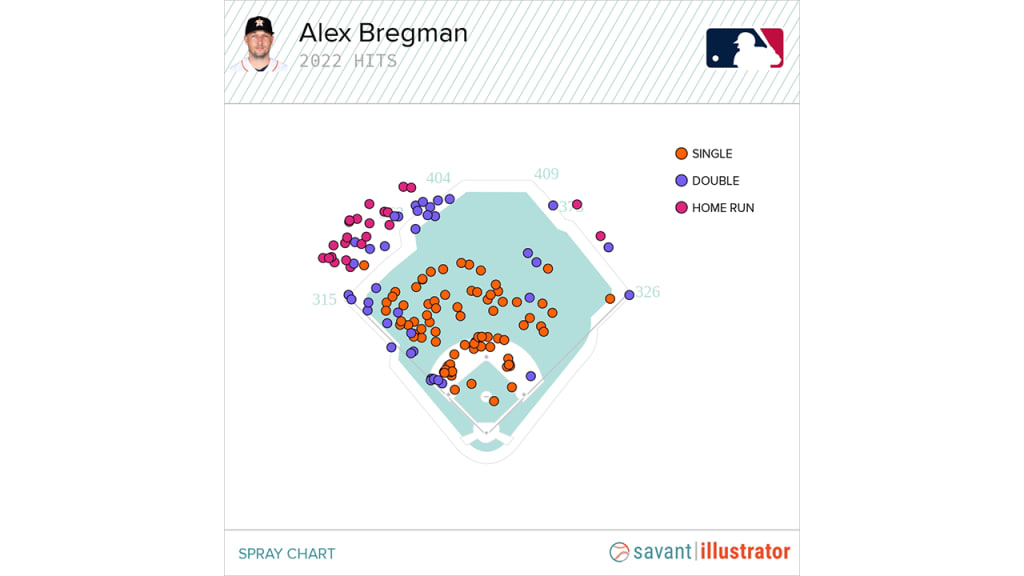The Yankees are down two games to none in the American League Championship Series, and we’re not going to lie to you: It doesn’t look great. The eye test says the Astros are clearly the better team, and the numbers say that teams down 2-0 in a best-of-7 come back to win only about 15% of the time. At FanGraphs, which takes into account the specific players on these teams, the Yankees get a 19% chance of winning the series.
Of course, 15% or 19% isn’t 0%, is it? Coming back from down 2-0 happened as recently as the 2020 NLCS, when the Dodgers came back from a 2-0 deficit to the Braves and went on to win the World Series. Yankee fans might remember – or choose not to remember – the 2004 ALCS, when they were up not 2-0 but 3-0 against Boston, and then … well, you probably know the rest. (In the history of seven-game series, there have been 14 comebacks from a 2-0 deficit.)
Winning four out of the next five games is a tall task, but not an impossible one. The numbers tell you the Yankees have about a one-in-five shot of coming back. They just have to find the right combination of factors to make this timeline one of the ones where they come out ahead.
If they’re going to do it, this is going to be how.
1) Now they get to use their best starting pitchers.
The series starts anew in Game 3. No, you obviously can’t wipe away that the Astros are up 2-0 in the series, but there’s nothing the Yankees can do about that right now. All they can do is focus on what’s next, and the truth is this: Houston just used their best two starting pitchers, and the Yankees are about to use their two best starting pitchers.
Right? Justin Verlander and Framber Valdez, two of Houston’s All-Stars, are unavailable in Games 3 and 4. Gerrit Cole and Nestor Cortes Jr., two of New York’s All-Stars, are lined up for those games. It’s not that Jameson Taillon and Luis Severino (who started the first two games for New York) pitched poorly; it’s not that Cristian Javier and Lance McCullers Jr. (the Games 3 and 4 starters for Houston) aren’t talented pitchers in their own right. It’s that Houston had a clear starter advantage for the past two games, and New York likely does for the next two games.
Including the postseason, the Yankees were 43-22 this year when Cole and Cortes started. That’s a .661 winning percentage, or a 107-win pace over a regular season.
“If it's 2-0 or if it's 1-1 or it's 0-2, it can't affect the way I go about my business,” Cole said. “We all have a job to do. We play each and every game in and of itself, play each and every pitch within each and every game until there's no more pitches to play, win or lose.”
Now, there’s some twists and turns to this. In Games 5 and 6, you’ll likely go right back to the same matchups you saw in Games 1 and 2, meaning the Yankees all but have to win the next two games. But if the Yankees can survive that and get to a Game 7, there’s the option for Cole to go on three days rest. The Astros would not have that same option with Verlander and Valdez, and using Javier on short rest seems somewhat unlikely given that A) he’s never started a postseason game before and B) he’s never started on three days rest after another start.
That’s not to say Houston wouldn’t have Game 7 options, because Jose Urquidy or Luis Garcia might be in a lot of other playoff rotations for other teams. But they’re not Cole, either. The ability to use him twice more where Houston can’t use Verlander or Valdez twice more is the key to a potential Yankee comeback.
2) The next three games are at home.
Without getting into all the angst about the open roof and Aaron Judge’s just-short fly ball in Game 2 – as though the Yankees have never benefited from a short right field porch before – there are some interesting home field aspects to the next three games.
There’s the simple fact that the Yankees were a much better home team (.704, tied for the best in baseball) than they were a road team (.519, 10th-best) during the regular season. They score more runs per game at home (5.2 to 4.8); they prevent more runs at home (3.3 to 3.7). Obviously, the Astros are a good team most everywhere, though considerably better at home (.679) than away (.630). It at least positions the Yankees better in Games 3-5 than it did in Games 1-2.
For the Astros, the name to watch here is Alex Bregman, who has a pretty serious difference this season in how well he hits at home (.972 OPS) against the road (.673 OPS). Lest you make just the laziest possible sign-stealing joke, note that for his career there’s no split whatsoever, but it does tell you a little about his style of hitting this season. For a power hitter, he doesn’t actually hit the ball that hard – just 36th percentile in hard-hit rate this year.
But look at where those hits, and in particular those home runs, have gone. No one loves the Crawford Boxes in Houston like Bregman loves the Crawford boxes.

Of his 25 home runs this season, including his pair in the postseason, 18 of them have come in Houston, and 16 of those went to that short left field porch, an advantage he will not have in New York.
It’s not a team-wide thing, necessarily; Yordan Alvarez had no home/road split this year, and Yuli Gurriel and Kyle Tucker hit better on the road. But if the next Bregman fly to left lands in the glove of a fielder rather than a fan, it could be of immense importance.
3) It’s been a close matchup this season.
The Yankees and Astros have played nine head-to-head games this year. The Astros have outscored the Yankees by all of eight runs. Baseball victories count the same whether you win by one run or 20, of course, so long as you have more, and so the Astros have won seven of those nine.
Maybe that’s the difference between a team that “has it” and one that does not, but the point here is that they’ve played tight games all year – this isn’t the Astros outsourcing the A’s by 37 runs, or the Angels by 30, or the Yankees topping the Red Sox by 33 runs.
It is, on the whole, less than one run per game, close enough that one single break – a fly ball to right field going three extra feet, for example, or a controversial strike call going a different way – could be the difference between a win and a loss.
4) Aaron Judge is still the (presumptive) AL MVP.
Back to those two times the Yankees beat the Astros, and remember how they happened.
On June 23 in the Bronx, Taillon pitched poorly (allowing six runs in 5 2/3 innings), and the Yankees were down 6-3 in the bottom of the 9th. After an incredibly rare rally against one of baseball’s best relievers in Ryan Pressly tied the game – on, believe it or not, an Aaron Hicks home run – Ryne Stanek entered, ultimately facing Judge with two on and two out. Judge didn’t let it go to extras:
Three days later, Urquidy held the Yankees to a single run over seven innings, before a DJ LeMahieu home run off Phil Maton tied the score at 3-3. That’s where it remained into the 10th inning, when Judge stepped up with two on and two outs against Seth Martinez. Judge didn’t it go further into extras.
You wouldn’t necessarily think it, given the payroll and the names the Yankees can offer, but one of their main issues right now is a lack of offensive superstars.
Aaron Boone might get lucky with a key hit from a Kyle Higashioka, or an Oswaldo Cabrera, or an Isiah Kiner-Falefa. Maybe Josh Donaldson (who at least has a .393 OBP to go along with a large strikeout problem this postseason) turns the clock back a decade one more time. But postseason offenses, largely, run on stars and home runs. There’s no star larger than Aaron Judge. You hate to say “it’s him or they go home,” but if it is, there’s very few hitters you’d count on more.
If Judge doesn't bring it? Well, then the Yankees were never going to get that ring, anyway. It may seem dire right now -- being down 2-0 always is -- but in the grand scheme of baseball, two games is almost nothing. Momentum is never real, lest we remind you that Seattle had an all-time comeback in Game 2 of the Wild Card Series and in their next game promptly choked away a 7-3 lead to Houston in Game 1 of the ALDS.
That the Yankees are down 2-0 is reflective of how they've played, and is a credit to the Astros. What happens over the next two, or three or four or five games? Well, that's entirely up to them.
